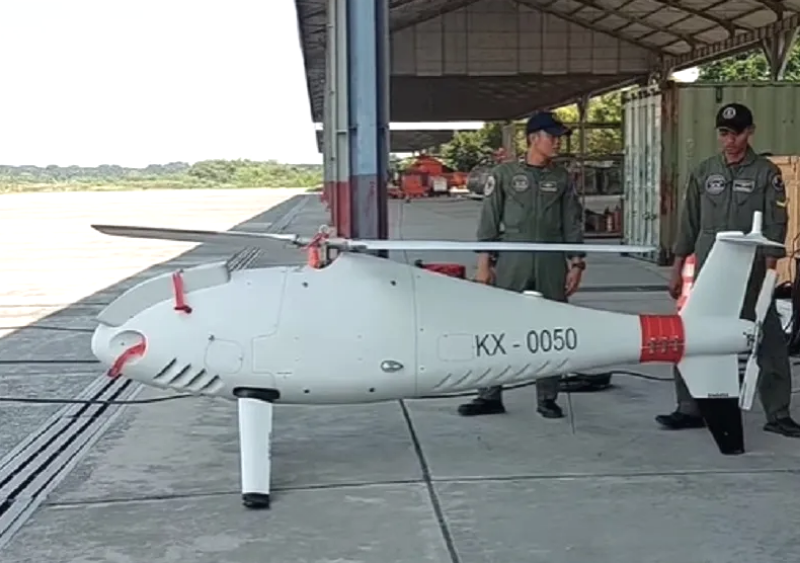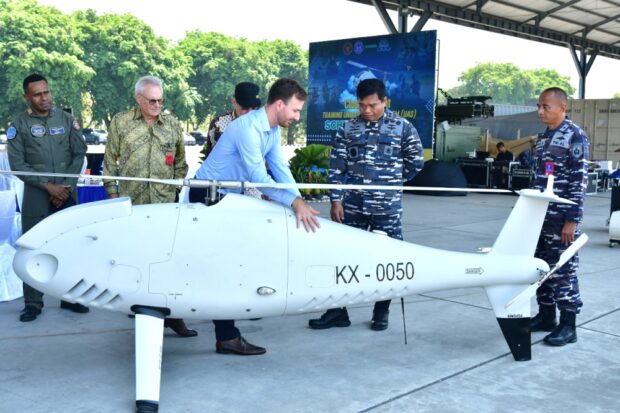The Commander of the Indonesian Navy Aviation Center (Pusat Penerbangan Angkatan Laut, Danpuspenerbal), Rear Admiral Dr. Imam Musani, closed the Unmanned Air System (UAS) training for the Schiebel Camcopter S-100 and inspected the operational flying capabilities of the new Ron 700 Drone of Squadron 700 Wing Air 2 Puspenerbal on Friday, September 29, 2023.
From September 11 to September 28, 2023, technical support activities were conducted for one unit of the Unmanned Serial Vertical Takeoff and Landing Maritime Surveillance System, which was attended by 10 personnel from Squadron Air 700 Wing Air 2 Indonesian Naval Aviation Juanda. The addition of one unit of the Camcopter S-100 UAS with its advanced capabilities will undoubtedly enhance the capabilities of Squadron 700 Wing Air 2 in monitoring and securing maritime borders.
The closing event of the Schiebel Camcopter S-100 UAS training and the test flight of the new drone took place at Shelter 700 Wing Air 2 Puspenerbal, Juanda Naval Air Base. Present at the event were Deputy Commander of Puspenerbal, Rear Admiral Bayu Alisyahbana, Indonesian Naval Aviation’s Naval Colonel (Ret.) Bambang Yunianto, as well as various officials and the Commander of Squadron 700 Wing Air 2 Juanda. Addressing the participants of the advanced Camcopter S-100 UAS training, Rear Admiral Dr. Imam Musani, affectionately referred to as Danpuspenerbal, emphasized the importance of applying and enhancing the knowledge acquired during training. The dedication required for meticulous maintenance and upkeep by the crew members to ensure that the Camcopter S-100 can operate effectively at all times.

Indonesian Naval Aviation Schiebel Camcopter S-100 Unmanned Aerial System Training. (Photo by Puspen TNI)
The Schiebel Camcopter S-100 is an Austrian unmanned aerial vehicle (UAV) using a rotorcraft design. The unmanned aerial vehicle is a proven capability for military and civilian applications. The Vertical Takeoff and Landing (VTOL) UAS needs no prepared area or supporting launch or recovery equipment. It operates day and night, under adverse weather conditions, with a range out to 200 km, both on land and at sea. The S-100 navigates automatically via pre-programmed GPS waypoints or can be operated directly with a pilot control unit. Missions are planned and controlled via a simple point-and-click graphical user interface. High-definition payload imagery is transmitted to the control station in real time. Using “fly-by-wire” technology controlled by redundant flight computers, the UAV can complete its mission automatically in the most complex of electromagnetic environments.
Produced by the Austrian company Schiebel, it was developed from 2003 to 2005. With a maximum take-off weight (MTOW) of 200 kg (440 lb), its endurance is 6 hours (extendable to over 10 hours with optional external AVGAS fuel tanks fitted). It has a maximum speed of 220 km/h (140 mph) and a ceiling of 5,500 m (18,000 ft). It is powered by a 41 kW (55 hp) Diamond engine and can carry various payloads, such as electro-optics and infrared sensors.The primary radio link between ground station(s) occupy the 5030?5091 MHz band. A secondary link in the UHF band would operate within 433.2125 MHz to 434.4625 MHz. it successfully tested a company-developed heavy-fuel engine interchangeable with the standard Diamond engine. This heavy-fuel engine allows for the use of JP-5, Jet A-1 or JP-8 jet fuels. These fuels, which are standard on marine vessels, are safer to store and handle than gasoline.
Source: Military Leak

